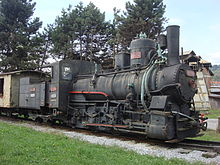Talk:0-6-4T
Appearance
| This article is rated Start-class on Wikipedia's content assessment scale. It is of interest to the following WikiProjects: | |||||||||||||||||||||||
| |||||||||||||||||||||||
Requested move
[edit]0-6-4 → 0-6-4T – As per 0-4-4T et al., this is a type that was only used for tank locos. Therefore 0-6-4 should redirect to the canonical page at 0-6-4T, not the other way round. Andy Dingley (talk) 16:54, 2 February 2012 (UTC)
- Moved Noncontroversial move. Alpha_Quadrant (talk) 23:08, 11 February 2012 (UTC)
Requested move
[edit]Revert recent move from 0-6-4T to 0-6-4.
0-6-4 → 0-6-4T – As per 0-4-4T et al., this is a type that was only used for tank locos. Therefore 0-6-4 should redirect to the canonical page at 0-6-4T, not the other way round. Andy Dingley (talk) 15:45, 22 August 2012 (UTC)
- Hi Andy, I'm not so sure about "only used for tank locos". Take a look at these:
 |
 |
 |
André Kritzinger 16:14, 22 August 2012 (UTC)
- I don't see your point - they're tank locos, so 0-6-4T. Even if they were to be considered as a tender, that would then be an 0-6-0 (with tender).
- The point about an 0-6-4T is that the trailing bogie is there, just like these, to support a large bunker - too much for a mere 0-6-2T to carry. Now if it's an 0-6-4 tender loco, then the only times (and this is pretty rare) that any sort of four-coupled trailing bogie is needed is to support a really rather large firebox, bigger than a Pacific. Such things do exist, but only on really large locos, the sort that are either fast enough, or heavy enough at the front end, to also need a leading pony truck or bogie. There are 2-6-4 tender locos (albeit rarer than 2-6-4T), but no 0-6-4 tender locos. Andy Dingley (talk) 16:35, 22 August 2012 (UTC)


